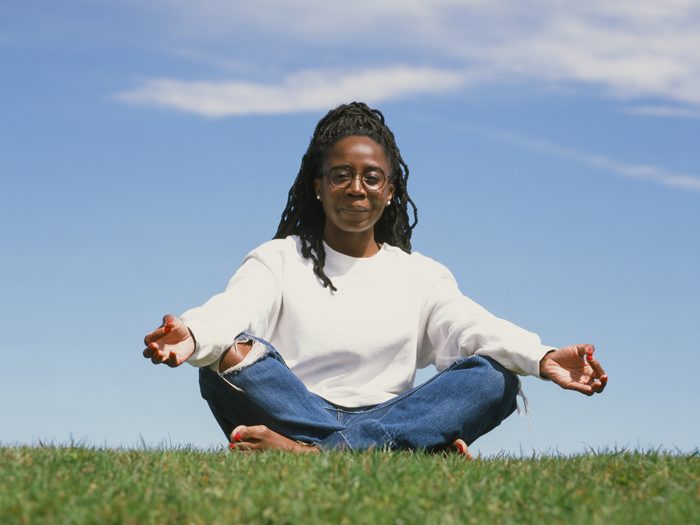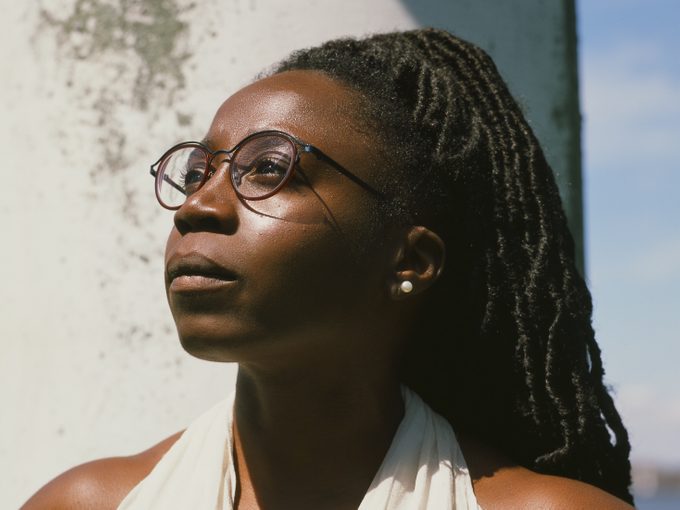“For Me, Self-Care Is Self-Compassion”

What comes to mind when you think of self-care? Maybe it’s scented candles and a meditation app or colouring books and a face mask. But Montreal-based wellness entrepreneur Nancy Zagbayou believes self-care is not something to be purchased. “For me, self-care is self-compassion,” she says. “And that compassion gives us the ability to be resilient.”
Zagbayou, also known as the Yogini Nancy, is a yoga and meditation educator, as well as a inclusion consultant for the wellness industry—an industry that in the past year has been called out for excluding Black and Indigenous people, and people of colour. Zagbayou says racialized women are often “made to think that caring for ourselves is a luxury when, in fact, it’s not. It’s fundamental.”
Here, she explores the true meaning of wellness and how to create spaces that are welcoming to everybody and every body.
(Related: Celina Caesar-Chavannes: ‘I Can’t Keep Pretending to be Something That I’m Not’)
This feels like a loaded question these days, but how are you doing?
I feel like I have the tools to manage the current situation, and I’m staying busy. That is helping me be well.
What exactly is helping you right now?
Having a routine that is set—I sleep at the same time and wake up at the same time. I may not be on my [yoga] mat every day, but I read about philosophy, meditate or focus on my concentration, do some breathing exercises or participate in acts of service every day. Any time I’m doing an element of yoga, it helps improve my mood.
Are these tools you’ve always had or ones you’ve developed over time?
When I was working [in my early 20s as a financial analyst] on Wall Street, I had no tools. I was very stressed, and my mind was very busy. When I moved to New York City, I was living by myself. So already, that was taking me away from my support system—and I didn’t know then about yoga or meditation. I was drinking and partying instead. But I learned a lot from that experience. I learned the impact of stress on the body and the importance of family and friends. I learned to ask for help when I needed it. I experienced the right amount of stress so that it was a catalyst to look for the tools to cope.
(Related: This is Languishing—The Mental State Many of Us Are Experiencing Right Now)
A lot of people think of stress as a bad thing, but it sounds like that’s not your outlook.
I don’t think all stress is bad. If you have no stress, you have no action. You need the momentum to get you going. There is no life without stress. So it’s something you have to tame—in French, we say “apprivoiser”—understand and then work with as you navigate through life.
At its core, wellness is about people caring for themselves. So how did the industry become so white?
There is one word that can describe it all: capitalism. When people realized they could make a profit, it changed the nature of wellness. The wellness industry is a multi-trillion-dollar industry. So when people stand to gain something, sometimes they’re thinking of the bottom line and not enough about the people they should be serving.
What have you observed through your own experience?
The wealth created by this industry doesn’t necessarily trickle down to people like me. I had an experience where I was doing the same exact position as someone else [who was white]. That person was paid 20 percent more, and we did the same training. The only difference between her and me appeared to be skin colour. So the wellness industry is really a microcosm for the rest of society. When we see systemic discrimination or systemic racism in society, well, the wellness industry is not really exempt from those types of behaviours.
(Related: 8 Women Share the Impact the Pandemic Has Had on Their Mental Health)

As an inclusion consultant for the wellness industry, you engage with these issues. What has that been like?
It’s been an eye-opening experience to see how much people want to know and how much they don’t know. There’s so much that needs to be done as internal work—understanding our own biases and history. One client came to me, and she wanted to do anti-racism training. However, her intention was to do one hour for all her employees. One hour is not sufficient when people are starting out at a place where they have zero information about race relations or the history of racist policies.
Last summer, we saw a long overdue racial reckoning in the wellness industry. Have you seen meaningful change since then?
I have seen efforts, some performative, some sincere—but often still without the resources to back them up, or treating racialized people as tokens but not paying them what they’re worth or having anti-racist policies. Studios, gyms and institutions need to put more resources towards the things they say they are committed to.
How do you create inclusive spaces in your classes?
I think it starts with inviting people into the practice. That notion of “good vibes only” is dangerous. We all have a range of emotion, and allowing people to come to class with that range of emotion is healthy. Mental health is essential, and there is no shame in taking care of yourself and your health. Showing vulnerability and being open gives people permission to be themselves as well.
And I like to remind my students that there’s nothing to be achieved in the class. Everywhere else in the world, they’re being told to perform. Having, in that one hour or 45 minutes, permission to just be instead of do—I feel like that’s freedom.
(Related: What Being in the Mountains for Three Days Taught Me About My Health)
Have you adjusted how you teach yoga to meet people’s needs right now?
I really take the time to ask how they’re doing, how they’re arriving today and then how we can use those emotions in our practice.
So if someone had a tough day, what would you do?
I ask my students about their energy levels and then, with that, I adjust the level of intensity of the class—so I know not to give them a power vinyasa class when they’re depressed. I also adjust my narration so I can say things that are nurturing for where they are at that moment.
This past year has been a time of immense challenge but also change. What do you hope the wellness industry looks like in the future?
Beyond just representation, we need meaningful conversations where everyone is involved and we are given not just a seat at the table but the power to make decisions that impact our health and the health of people like us.
This interview has been edited and condensed.
Next, Hayley Wickenheiser describes what working on the frontlines of the pandemic has been like.




